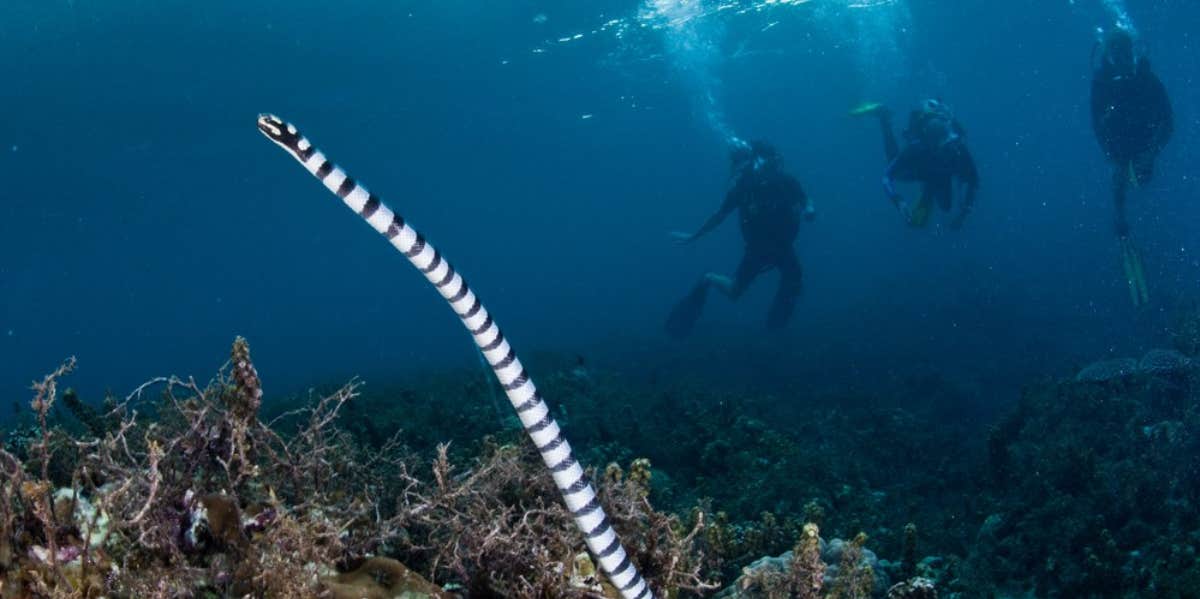Why 'Sexually Frustrated' Sea Snakes Are Mistaking Scuba Divers For Potential Mates
Love is blind.
 Shutterstock
Shutterstock Australian scuba divers are noticing odd behavior coming from male sea snakes whenever they come into contact with them.
Normally very graceful and peaceful creatures, the venomous reptiles have been coiling around one diver's fins, licking the water around him and even sometimes chasing him underwater.
Seems like the sexually frustrated snakes are finding mating season especially challenging!
Why do sea snakes mistake divers for potential mates?
During the reptiles’ mating season, the male sea snakes become confused and mistake scuba divers to be female sea snakes.
In a new study, the diver and another researcher analyzed 158 of these interactions with olive sea snakes over several years in the Great Barrier Reef.
RELATED: 8 Grossest Things Animals Do For Love
They display elaborate behavior that is commonly seen among the courtship between the sea serpents.
For instance, "Females don't do any chasing; they do the fleeing [during mating]," said Tim Lynch, a senior research scientist at CSIRO, Australia's national science agency.
"So swimming away from a male snake is mimicking courtship behavior," he adds, explaining that male snakes are which encouraged to follow divers who swim away.
"Males coil around females during courtship, probably to hang on effectively while they get into position to mate," said Rick Shine, an evolutionary biologist and reptile expert at Macquarie University in Australia, in an interview with Live Science.
After reading Lynch's study, Shine wanted to work together with him. “I read his thesis, thought it was great and convinced him to collaborate with me to finally publish these exciting results," Shine said.
The snakes’ poor vision causes them to approach divers.
"It's a lot more difficult to see through water than through air, especially if the water is rough or dirty," Shine said.
Sea snakes haven’t yet evolved to develop the visual system required to be able to see very well underwater.
Sea snakes rely more on scent than vision, as well as their ability to use their tongue to feel things out.
They have a special gland in the roof of their mouth that can analyze any chemicals in the water that get picked up by their tongues, according to Shine.
That is likely why tongue flicking was such a commonly observed behavior during interactions with divers, Lynch said. "They can only really confirm that you are not a female snake by licking you."
Fortunately, there’s little to fear from the snakes, as long as you understand what’s going on.
Are sea snakes dangerous to humans?
While olive sea snakes are venomous and deathly lethal to humans, researchers believe that they pose no increased threat to humans during their mating season.
The are just genuinely curious about humans.
"It was exciting; they are the most graceful of animals and also have no evolutionary relationship with people," Lynch said. "They are not actually trying to attack you; they are just curious."
A lot of the time — about 74 out of 158 times — males would just approach Lynch, and sometimes they would coil themselves around his fins or flick their tongue at the water around him.
The 15 occasions when the males would chase Lynch are thought to be because they were in the midst of a failed mating attempt.
"It's clear that most approaches to divers were by males who had lost contact with the females they were pursuing," Shine said. "They frantically search for a female if they lose touch with her."
"Very few recreational users of the ocean are bitten by sea snakes, so the danger is low," Shine said. "Most bites, including fatal ones, are to fishers who haul snakes out of the water."
During his research, Lynch has been bitten several times over the years. However, these were when he was physically handling the snakes, though he was always wearing wet-suit gloves for protection.
"Olive sea snakes do not usually bite unless harassed underwater," Lynch said, "But they are enthusiastic biters when brought onto land."
They are typically friendly, and scuba divers are known to swim with them all the time. As long as they aren’t harassed and you don't try to keep one as a pet, they won’t lash out and attack.
Isaac Serna-Diez is a writer who focuses on entertainment and news, social justice and politics.

